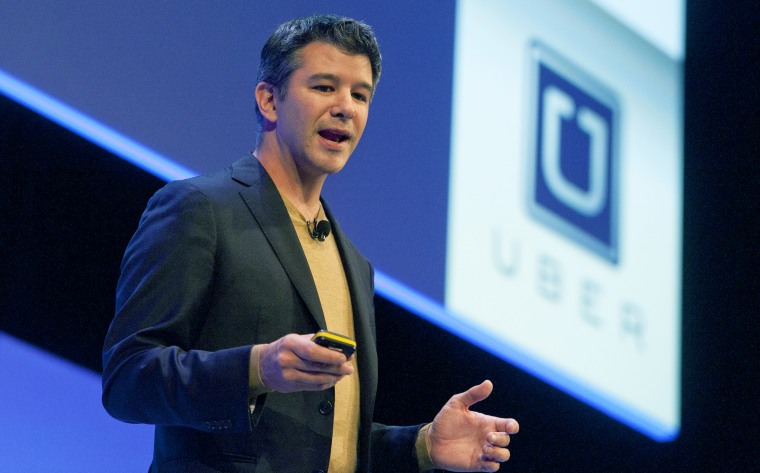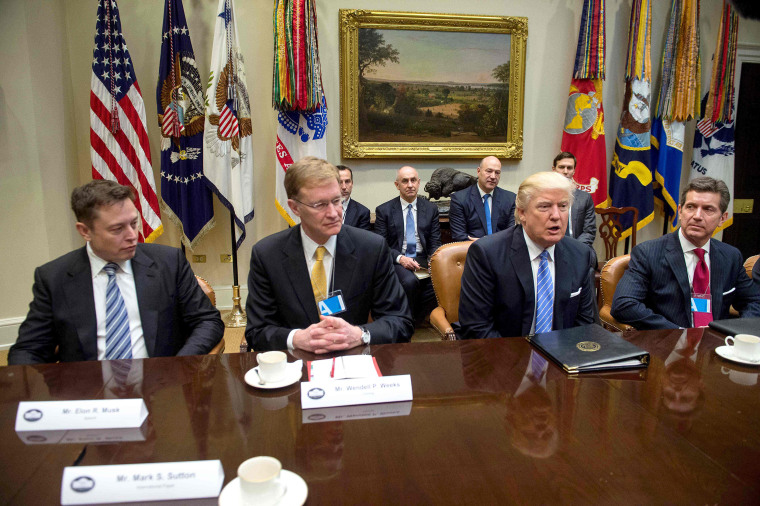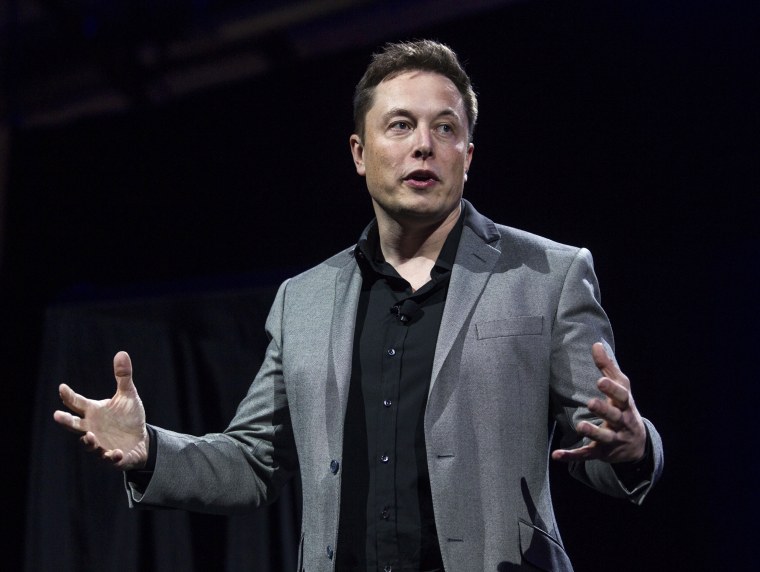Silicon Valley is making its voice heard in Washington D.C., telling CEOs who work with Trump: Back off or prepare to face the consequences.
Through planned demonstrations, Facebook messages, tweets and boycotts, companies are feeling the heat from employees and consumers who want to see business leaders distance themselves from Trump.

A Silicon Valley movement called Tech Stands Up to Trump is encouraging tech employees to walk off the job on March 14 at 12 p.m. to attend a rally at Palo Alto City Hall. More than 1,100 people have committed on Facebook, with thousands more expressing interest.
Brad Taylor, an engineer at Optimizely, told NBC News he created the event last week because he was disheartened by Uber CEO Travis Kalanick's cooperation with Trump.
Kalanick was the first leader to quit President Trump's business advisory council, one day before he was set to join more than a dozen other executives for a meeting at the White House.
Related: Uber CEO Travis Kalanick Quits Trump’s Advisory Council Under Mounting Pressure
"Joining the group was not meant to be an endorsement of the president or his agenda but unfortunately it has been misinterpreted to be exactly that," Kalanick said in a memo to employees.
Now, Tech Stands Up to Trump is hoping its demonstration will send a strong message from the technology community and perhaps elicit an even greater response from tech leaders taking a stance against the president.
Kalanick's case already seems to have set an encouraging precedent for the tech community: Tech Stands Up to Trump co-founder Brad Taylor told NBC News he was spurred to action due to "the result of the widespread collective action" that prompted the Uber CEO to step down from Trump's council.
"We are mindful, however, that Donald Trump’s executive order on immigration has already led to the revocation of over 100,000 visas," Taylor said. "Through sustained pressure and collective action, we can overturn this harmful and destructive ban that undermines our shared values."
Employees Take a Stand
While Kalanick bowed to the pressure — which reached a boiling point last week with the #DeleteUber hashtag — other CEOs are seeming to ride it out, despite internal pressure from employees.
IBM CEO Ginni Rometty, who is another member of Trump's business advisory board, wrote an open letter to the president-elect in November expressing optimism for how IBM can work with his administration.
Elizabeth Wood, a senior content strategist at the company, responded with her own open letter to Rometty in November, announcing she could no longer work at the company. A few weeks later, IBM employees started a petition.
At Oracle, the appointment of co-CEO Safra Catz to Trump's transition team prompted George A. Polisner, who managed Oracle's Cloud services, to resign from the company.
Polisner also wrote an open letter, allowing members of the Oracle community to sign it and express, "Donald Trump is not who America is, and he is not who Oracle Corporation is."
At Google, more than 2,000 employees, including CEO Sundar Pichai, walked off the job on Monday to protest Trump's immigration order. The movement even earned its own hashtag, #GooglersUnite.
Pichai and co-founder Sergey Brin spoke to those who gathered at the Mountain View, California campus. Brin, who was a refugee, also expressed gratitude for being admitted to the United States from the Soviet Union during the Cold War, according to an attendee.
Hitting Them in the Pocketbook
You can write letters and hold signs, but another method is hitting companies where it really hurts — in the pocketbook.
At Uber, the pressure intensified last weekend after the #DeleteUber hashtag began trending. The social media campaign gained traction after critics interpreted Uber as having broken a taxi workers' strike at a New York airport amid protests of Trump's executive order temporarily banning immigrants from seven Muslim-majority countries.
Hitting Uber's bottom line worked: More than 200,000 people deleted their accounts, according to the New York Times.
There's also a website called #GrabYourWallet, providing a comprehensive list of companies that have supported Trump or do business with the president's family. The movement was started last year by a grandmother and a brand strategist, according to its website, after a tape was released of Trump making lewd comments about "grabbing" women.
The site provides a running list of companies that carry Trump merchandise or do business with the president's family. As of Friday, 116 companies were listed, along with phone numbers for consumers to call and voice their disapproval.

A separate "FYI" section lists companies that have expressed support or have CEOs who are on Trump's advisory board, including Pepsi CEO Indra Nooyi, General Motors CEO Mary Barra and Tesla and SpaceX CEO Elon Musk.
Related: Who's on Trump's Business Advisory Council?
Putting on the Pressure, One Tweet at a Time
Musk, who is an avid tweeter, has taken a bit of flak on Twitter for his decision to engage with Trump, prompting him to explain why he's staying on the board.
Being on the advisory committee does not mean he agrees with the actions of the Trump administration, Musk said in a statement on Thursday.
"I and others will express our objections to the recent executive order on immigration and offer suggestions for changes to the policy," Musk tweeted.
Jason Schloetzer, an associate professor at Georgetown University, told NBC News Musk's rationale for staying on the board makes sense.
"If you’re passionate about business and you believe your business can help solve important world issues, then your executives have a reason to be a part of that council," he told NBC News. "But I think that staying on the council creates a need for some public relations work with internal employees and external constituents, including customers... to emphasize the fundamental point of being on the council."
